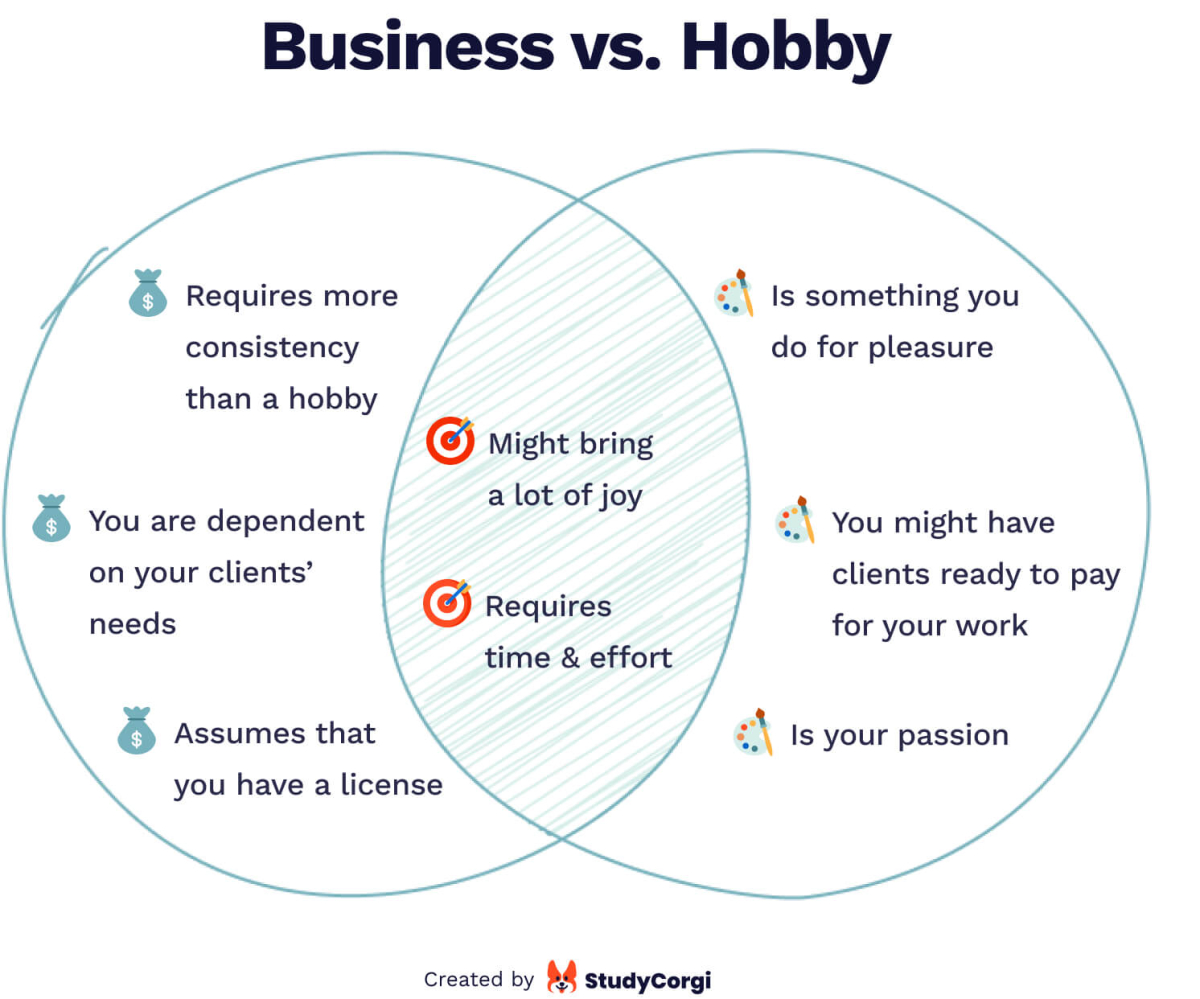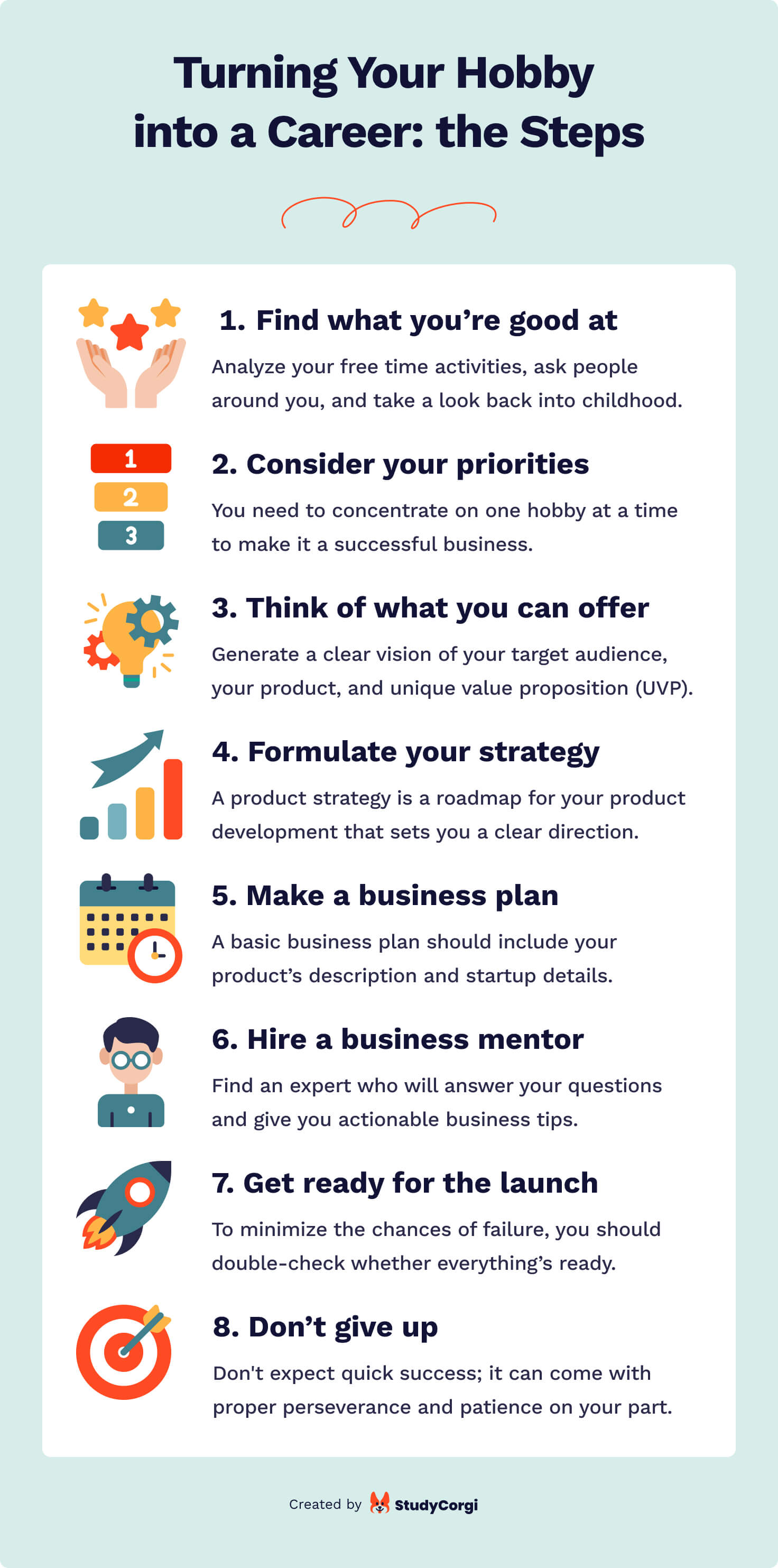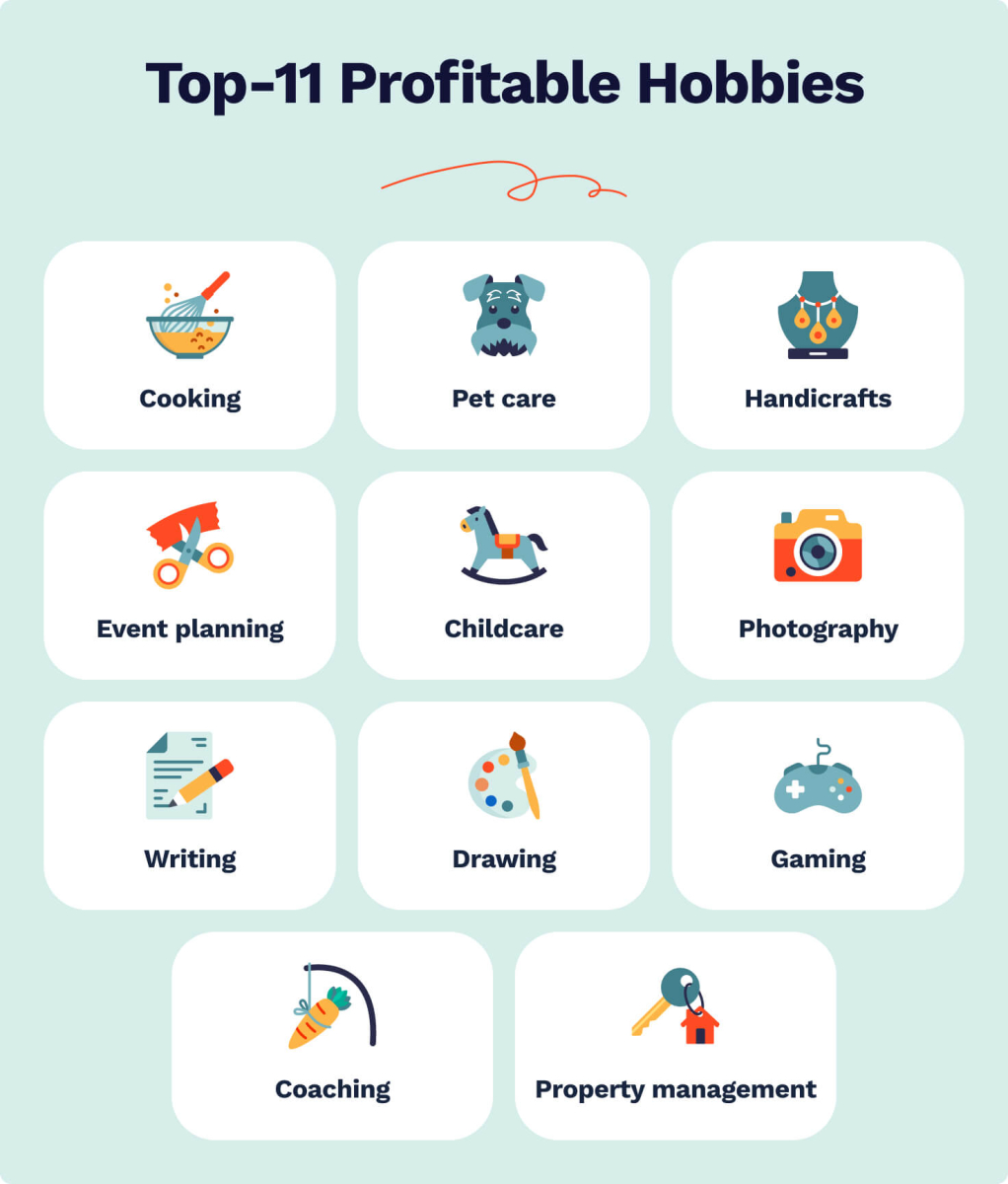Hobbies make your life brighter and more enjoyable. Most people think of hobbies as an exciting pastime and consider their jobs dull money-making necessities. But the good news is that you can combine both and transform your life by making your hobby into a lucrative enterprise.

Ready to learn more?
Here our experts will detail a step-by-step plan to turn your hobby into a business. You’ll also find information about the top 11 monetizable hobbies. Use these tips to choose your unique path and drop the dreadful 9-to-5 schedule for activities that inspire.
🆚 Business vs. Hobby
Before we begin, let’s clarify the terms to ensure everyone’s on the same page. So, what’s the difference between a business and a (monetizable) hobby?

A Hobby
A hobby is usually a passion of yours. It is an activity that makes your heart beat faster and brings a smile to your face.
Maybe you take photos, make pottery, or knit those tiny little socks for pleasure. But the key point is that this activity brings you pleasure – that’s why you do it; that’s your priority.
Even if you have clients ready to pay for your labor, it’s probably still a hobby. You may render your services to customers from time to time but maintain your own schedule and enjoyment of the process.
A Business
Once the scale of orders and the workflow increase, a hobby gradually transforms into a business.
How can you tell that you’re already a businessperson and not a hobbyist anymore?
This happens when you let the volume of client orders determine how much and how long you work.
For example, you might knit one pair of socks a week for pleasure, and that is enough for you. But when you see clients lining up for your socks, and you begin to knit a pair per day, that’s something of a business enterprise already.
Other features of a hobby-business transformation are:
- Dedicating consistently more time to your hobby;
- Following the clients’ lead instead of your own inspiration;
- Getting an official license for this activity;
- Hiring an accountant to manage finance and pay taxes.
These signs may seem dreadful for some hobby lovers since this change brings the risk of losing the sense of fun and fulfillment from doing what you like. However, if you’re reading this article, you’ve probably decided to turn your hobby into a successful business project. So, let’s go!
🔢 Turning Your Hobby into a Career: Step-by-Step Guide
Here is a detailed plan to make the transformation easy and manageable. Don’t skip any of these steps and you’ll come out with a viable business project.

Step #1: Figure Out What You’re Good at
The first thing you need to do in order to make money from a hobby is to actually have a hobby. You may love plenty of different activities, but not all of them will offer a solid base for a business venture. Instead, focus your efforts on a viable idea, which can be identified as follows:
Step #2: Consider Your Priorities
After a quick analysis, you may see that you’re good at, and passionate about, many things. It’s natural to have versatile talents and pursue different vocations. Still, you need to concentrate on one hobby at a time to make it a successful business.
So, it’s time to set priorities.
We recommend picking one activity since a career change is always a challenging transition period.
You will need to invest a lot of time and effort into making it work; unfortunately, there’s no guarantee of success. At times, you will have to push yourself to continue, so it’s better to choose something you’re really crazy about. Otherwise, you might quickly burn out and drop the one-billion-dollar business idea.
A realistic approach always works better than a dreamer’s one. Be honest about all the pros and cons of dropping a 9-to 5 job and transforming your hobby into a business; this sober outlook will keep you from bumping up against disappointment during the process.
Step #3: Think of What You Can Offer
At this point, it’s necessary to generate a clear vision of your:
- Product;
- Unique value proposition (UVP).
This is easier said than done, but this step is essential to the process of formulating your business idea. You can’t develop relevant products or services if you don’t know who will buy them. Think of your target customers as follows:
- If you were a customer buying your product, what would you be like?
- What pain points is your product addressing? What people experience those pain points?
Conduct rigorous research online to see what kind of people buy related products, what they need, and what they still lack among the existing offerings. Take a closer look at your successful competitors – how do they monetize their products? How do they appeal to customers?
Let’s consider an example: a home cake baking business.
Those ideas will inform your unique product design approach and help you formulate a striking UVP. Besides, by identifying what your users lack, you can differentiate your UVP from others and give customers added value.
Step #4: Formulate Your Product Strategy
A product strategy is a roadmap that you draw to set a clear direction for your product’s development.
You can say that your product strategy is ready if you have decided on the final vision of your product as well as a set of workable steps to achieve that vision.
The strategy’s components include:
- Target customers;
- Target market;
- A detailed description of the product with a set of unique features that set it apart from competitors’ offerings;
- The unique value you deliver to customers;
- Your pricing plan;
- Distribution channels.
The formulation of your product strategy may seem intimidating at first, but in reality, it’s not challenging at all. You only need to write down the details about your target users, product characteristics, and UVP that you formulated in the previous step.
Now, following the strategic steps we’ve just discussed, you can strategize your cake baking business like this:
Step #5: Make a Basic Business Plan
Now, it’s time to dig deeper into the details of your strategy. Nothing can help you better than a business plan.
Product
The business plan should include your product’s description and startup details:
You should also consider the brand name and identity of your product.
Keep the name short and meaningful, avoid hard-to-spell versions, and keep long-term business goals in mind.
You can always use Google to research how others have named similar startups and avoided plagiarism issues.
Market Research
A business plan should be informed by research insights you can discover through rigorous market analysis.
By this moment, you should have an inside-out understanding of your target audience and competitor landscape to figure out how you will win a share of the existing client base.
Include the following details in your business plan:
- Socio-demographics of your target audience (gender, age, location);
- Online behavior and preferences/habits of your target users;
- User personas;
- List of competitors and your unique position;
- Latest trends and dynamics of your industry.
Sales and Marketing
This is the financial aspect of your business plan.
Here, you should outline the distribution channels you plan to use for your product and set a coherent pricing plan.
Other things to lay out in the business plan are:
- B2C or wholesale selling;
- Online or offline distribution;
- Organic and paid advertising channels;
- Social media marketing.
Financials
You also need to think over the financial factors of your business launch:
- How much money do you need to start the business?
- How much do you have?
- Where can you borrow the missing part of the budget?
- What are your financial goals for the next 3-6-12-24 months?
Management/Operations/Development
The daily functioning of your startup is also a vital aspect of concern. The final section of your business plan should include data about:
- Who will run your business (you or an appointed manager/director);
- How the business will operate;
- How the product will be designed and produced;
- What deadlines you will set for product development;
- Where the development and operations teams will work (in an office, at home, or as an outsourced team).
Step #6: Think of Hiring a Business Mentor
Still have doubts about the best way to enter the market and launch your product? Then you might benefit from a partnership with a business mentor.
Hiring a coach with hands-on experience in business launches offers several advantages:
- You’ll have an expert who will answer your questions and give you actionable business tips.
- An outsider can offer a sober, objective perspective.
- A mentor can hone your business skills and save you from typical startup blunders.
- Mentors offer essential support in the stressful business launch period.
It’s always a good idea to engage an experienced partner in the project, thus reducing the tension and confusion of first-time entry into the market.
Step #7: Get Ready for the Launch
Congratulations, only one step separates you from the start of your business, and that’s a killer product launch.
To minimize the chance of failure, you should triple-check to make sure all the details are in place.
Vital preparatory steps include:
- Getting an official license from your local agency for your business activity.
- Registering a business entity.
- Setting up a business website and branded social media accounts.
- Seeking business credit for business growth goals.
- Setting up effective channels for contact with clients: live chat, hotline, corporate email.
- Insuring your business.
Once all these tasks are completed, you’re ready to launch. Good luck!
Step #8: Don’t Give up
Now that you’ve started a hobby business, the key task is to keep going. Don’t expect immediate success.
Achievements come with perseverance and patience on your part.
Even work-at-home businesses can quickly scale up if you follow these productivity tips and ensure positive work habits:
🏆 Bonus: Top-11 Hobbies that Make Money
Now, let’s take a look at a list of 11 profitable hobbies that have already earned people hundreds of thousands of dollars. You can use them for inspiration and see how people like you turn a hobby into a career.

1. Cooking/ Baking
The cooking/baking industry is a broad area where every food fan can find their vocation. People love tasty food and are ready to pay a premium for it. You may be great at baking muffins, or your friends might lick their fingers when eating the BBQ ribs you’ve made.
Anything, from first-course dishes to desserts, can be your unique product that will become a local hit if properly packaged and branded.
Choose the menu carefully and clarify the business model you want to pursue. You might want to specialize in home delivery to feed the busy nine-to-fivers or provide exclusive catering services for events like weddings or birthdays.
2. Pet Care
People’s love for pets can do wonders. It puzzles and amuses those without a furry partner, but it can become a lucrative business idea for you, especially if you’re in the pet lover section. Business options are endless in this domain:
- Pet grooming and washing
- Pet walking
- Customized pet clothing
- Healthy pet food
- Pet event catering (weddings, birthdays)
You can add many more alternatives here. Your imagination is the only limit, as pet fans always welcome new treats for their favorite animals.
3. Jewelry, Handicrafts
The preference for hand-made jewelry and accessories has replaced mass market items, which you can see by examining the stats of Etsy merchants.
People want exclusive things made specifically for them to bring warmth and comfort to their homes.
You can pick from any of the plentiful niches in this industry:
- Hand-made candles
- Greeting cards
- Boxes for accessories and jewelry
- Craft soap
- Wooden toys
- Custom-made clothing
- Jewelry
- Home accessories
Anything will work out if you have good taste for design and unique ideas.
4. Event Planning
When a happy, exciting event is approaching, nobody wants to get distracted by the annoying hassle of organization. Whether it’s a wedding or a birthday party, it should bring only pleasure and fun. Sometimes, it’s easier to entrust the entire event planning process to a separate specialist who works for a commission from the event’s budget and manages all administrative issues, letting you enjoy the moment in all its splendor.
If you like decorations and event planning and know a thing about desserts and catering, this profession is an ideal hobby business.
You will meet a ton of interesting people, develop a network of food, flower, and textile providers, and live in an atmosphere of beauty. A dream job, isn’t it?
5. Childcare
Small children require attention and care around the clock, since these small humans can’t do anything independently yet. But their parents sometimes need to balance work or education with round-the-clock childcare, or maybe they simply want to relax and have a few hours of free time.
You can be a babysitter if you like children and can get on the right side of these small bosses. The job is not as easy as it might seem at first glance; however, it is very flexible and always in demand.
The best thing about it is there’s no need to invest in an office, supplies, or raw materials – all you need is your free time, a bit of enthusiasm for play and fun, and a kind heart.
6. Photography
You might think that the photography niche is already overcrowded. There are plenty of photographers, from amateurs to prestigious college graduates. Still, thousands of people are searching for creative people with a unique perspective. Photography can become a lucrative career if you like taking photos and have mastered the basics of using your camera.
You’re free to explore many options, from taking people on local photoshoots to organizing a business photo agency, a content marketing firm, or a digital agency that produces photo and editing services.
Visual art is a booming field today, so you’re sure to find a place in the growing industry.
7. Writing
The whole world is at your feet if you can write well. You can specialize in any genre or type of writing business, earning a fair revenue from your talent. It’s worth considering a career in blogging or that of a fiction writer.
If you choose to write for money, the number one task is to find a loyal audience or clients ready to pay for your writing effort.
Chances are high that you will earn a fortune if you hone your writing talent and raise your writing rates as you grow.
8. Drawing/Design/Illustration
The digital market is booming today, so you can pick literally any career within the web design industry. It may be digital drawing, concept art, branding, illustration – anything that can work for blogs, websites, and web products. Your creative ideas and original approaches to visualization will be well-paid if you publish a portfolio on specialized platforms and stay active on social media.
9. Gaming
You might be surprised to hear it, but your gaming passion is also monetizable. It’s actually a well-paid job in IT agencies that develop and launch video or crypto games.
You can become a QA tester who checks all ins and outs of a game, spotting all bugs and pointing to gameplay inconsistencies.
Another lucrative gaming niche is p2e gaming, a popular, innovative market where gamers get monetizable awards for gaming activity. You can participate in lucrative airdrops, stake your crypto assets for a generous return, or participate in game sessions to get real money.
10. Coaching
Coaching has existed for many decades, but today it’s growing in popularity. Thanks to advancements in modern technology such as online platforms and virtual communication tools, more and more people are now discovering and harnessing the transformative benefits of coaching. The times when certified coaches had to spend years at college and have at least a Psychology degree are long gone. Today, you can be a coach after completing a brief course; you only need a good character, active listening skills, and a genuine interest in personal growth.
11. Property Management
Last but not least is the property management business. It’s also a versatile sphere of specialization that requires meticulous attention to detail. Investors may buy several apartments or office buildings, and then appoint a person to deal with rent, maintenance, bill payments, etc.
You can become such a manager, working for a commission on the rent or for a fixed rate.
You can also help your neighbors manage their houses while they’re on a long trip or a summer vacation.
Thank you for reading this article! We hope that it will inspire you to transform your life by making your hobby a career. If you already have such an experience, you are welcome to share your impressions and lifehacks below. Thousands of our readers will be able to use them.
